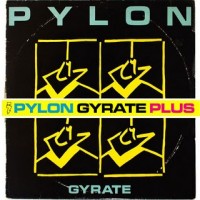
Pylon
Gyrate Plus (2007)
Joe Pelone
Athens, Ga. post-punk act Pylon released their full-length debut, Gyrate, in 1980. It's the sort of the album that, along with records like Wire's Chairs Missing and Joy Division's Unknown Pleasures, makes one wonder why musicians bothered forming post-punk bands. These three records alone sum up the genre perfectly, delivering jerky yet fluent numbers in perfect succession. These albums belong to the next generation of rock ân' roll canon. I admire and even enjoy bands like the Maccabees, Islands and YACHT for trying to continue this legacy of surreal dance music, but to a certain extent, they're 30 years too late.
Maybe the intro above is a little hyperbolic (only a little!), but it's hard not to get all NME when reading the liner notes to Gyrate Plus, a re-release featuring the original tracks backed by some choice singles and EPs. Testimonials from B-52's sing-speaker Fred Schneider, Gang of Four drummer Hugo Burnham and R.E.M. frontman Michael Stipe in the liner notes make the case for Gyrate's legacy before the disc even plays. Schneider and Burnham talk up the group's live show, while Stipe compares the album to Wire's 154 and Gang of Four's entertainment!, calling it part of a "library that stands as shockingly modern and unparalleled these many years later."
Hype is empty without quality tunes to back it up, though. Fortunately, Gyrate Plus meets expectations. On these early recordings, the band still sounds pretty harsh, especially compared to their colder, distant, still-fun followup Chomp, but underneath Randy Bewley's wall-o'-noise guitars and Vanessa Briscoe Hay's occasionally shredding vocals exists a fine, funky place. Maybe it starts with drummer Curtis Crowe--dude locks into a nervous yet steady beat and keeps it there on tracks like "Dub" and "Driving School." Bassist Michael Lachowski often holds it down as well, finding his own groove while Bewley explores the space and Hay shrieks and wails.
Despite drawing from several different sessions, Gyrate Plus flows well. "Cool" and "Dub," from their first seven-inch released in 1979, opens the album, segueing into Gyrate perfectly. From there, it's more grooves and spacey imagery. Hay often creates moods instead of stories. Deciphering the tone of the songs usually hinges on a single lyric. But it's all alluring; as experimental as the band gets, there's still an underlying pop element anchoring the songs. An alternate recording of the track "Danger," helpfully labeled "Danger!!", follows, and it's a lot more dub-heavy. An unreleased demo of a song called "Functionality" finishes off the album. Sonically, it's a palate cleanser compared to "Danger!!" in that the quality is grainer yet the music is more straightforward and driving. It's not quite on par with the rest of the collection, which is probably why it never found a home until now, but it's still a worthwhile curio.
At 16 tracks and 57 minutes, Gyrate Plus is an important document for all punk fans to check out. Like Stipe writes in the liner notes, it's still relevant in the new millennium.